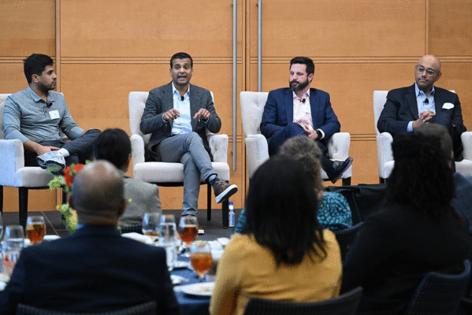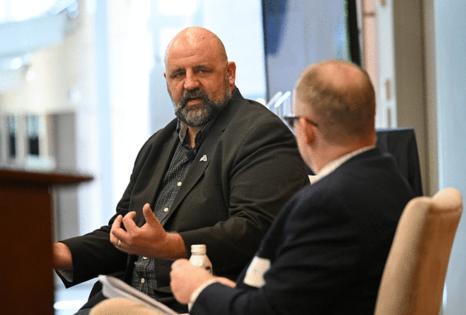How Atlanta's top business leaders are using AI in the workplace
Published in Business News
It’s hard to put the genie back in the bottle.
New research indicates generative artificial intelligence technologies have been adopted at a faster pace than the internet or personal computers, from chatbots like ChatGPT to image generators like Midjourney.
Generative AI tools, which analyze large subsets of data, recognize patterns and create new content from a written prompt, can perform an ever-growing number of tasks in the workplace. They can extract relevant information from lengthy documents and summarize it in three sentences, identify trends and correlations in a large set of data or help manage calendars.
During a panel discussion last Thursday at The Atlanta Journal-Constitution’s 2024 Top Leaders event, several Atlanta executives shared how their companies are adopting generative AI technologies into their day-to-day operations. Here’s what they shared:
How are companies in Atlanta using generative AI?
They’re using the technology to save time, increase productivity and bring ideas to life. A key advantage of generative AI tools is their ability to automate or streamline administrative tasks, which saves time and allows employees to work on other priorities.
Dr. Rahul Nayak, the physician director of Kaiser Permanente’s Virtual Medical Center, has run note-taking software in the background of his meetings with patients. This gives him the freedom to focus on listening to the patient directly while they’re in the room, rather than writing all of their needs down.
“This technology literally delivers on the promise of making a better experience for the patient and a better experience for the person providing the care,” Nayak said. “Every other piece of technology to date in health care that has been supposedly to help us out has essentially transferred administrative tasks from people who get paid less to people who get paid more and … put a barrier between us and our patients. This has taken the clock all the way back.”
For daily fantasy sports operator PrizePicks, which relies on machine-learning models for customer behavior and game performance, generative AI tools can help prototype applications or new game types within hours that would otherwise take a team of engineers weeks to complete, said Jay Deuskar, PrizePicks co-founder and chief technology officer.
LexisNexis, the world’s largest electronic database for legal information and public records, was one of the early adopters of generative AI, said Snehit Cherian, the chief technology officer of the company’s Global Nexis Solutions division. It recently launched an AI-powered legal assistant that can draft, summarize and research information. As it stands now, it takes less than a day to produce research that it would take a single person a week to gather.
Why now?
Artificial intelligence — which describes a computer’s ability to simulate human intelligence — is not new. Companies in Atlanta have long relied on machine learning and language processing models to drive their operations, even in health care, which Nayak says is slow to adopt new technologies.
Mercedes-Benz Stadium uses an AI-based screening system in place of traditional metal detectors and facial recognition software at entry gates. PrizePicks uses classification and regression machine learning models to model customer behavior or game performance.
What’s new, however, is how sophisticated AI models have become and the number of consumer-facing generative AI tools. Nayak says about 60% of Kaiser Permanente’s clinicians have used generative AI tools in direct patient care.
“If you think your people aren’t using it, you’re wrong,” Nayak said.
If companies are not investing in generative AI, they are at a disadvantage, said Kevin Johnson, the head of AI for Synovus, where this type of technology is relatively new. Team members at Synovus are using AI to generate faster responses to emails and summarize pieces of information for clients.
Karl Pierburg, the senior vice president and chief technology officer of football strategy and innovation with the Atlanta Falcons, said Mercedes-Benz Stadium is still in the early beginnings of integrating generative AI technologies. It wants to use the technology to personalize fan experiences but also to make its employees more productive.
“Half of our gen AI strategy is empowering our workforce and to really raise our ROE — our return on employee,” Pierburg said.
Can AI replace jobs?
The driving force behind generative AI software is the human entering the information. The human element has to be a critical component of AI, Johnson said. He finds it important to demystify the technology to show employees what AI is and what it is not. It gives team members an opportunity to modernize and shift how they are operating today to how they need to operate in the future. This way, a major risk of job loss or elimination is mitigated based on a new set of skills.
The widespread adoption of generative AI has the ability to cause disruption. People are going to get left behind, and that is going to be a challenging space to be in, Nayak said.
“Human intelligence has continually had to adapt to a variety of challenges. Your challenge used to be just finding a phone number,” Nayak said. “I think that’s probably not the best use of our intellect.”
What’s the future of AI?
No one knows for sure, but one thing is certain: what generative AI tools look like in two months’ time, never mind one year from now, will look drastically different from today. But in three or five years’ time, Nayak predicts it will help deliver a “deeply personalized experience that we could deliver at scale.”
“Technology is a space that is always evolving,” Cherian said. “So good technologists always have to evolve with technologies that are coming along.”
©2024 The Atlanta Journal-Constitution. Visit at ajc.com. Distributed by Tribune Content Agency, LLC.















Comments